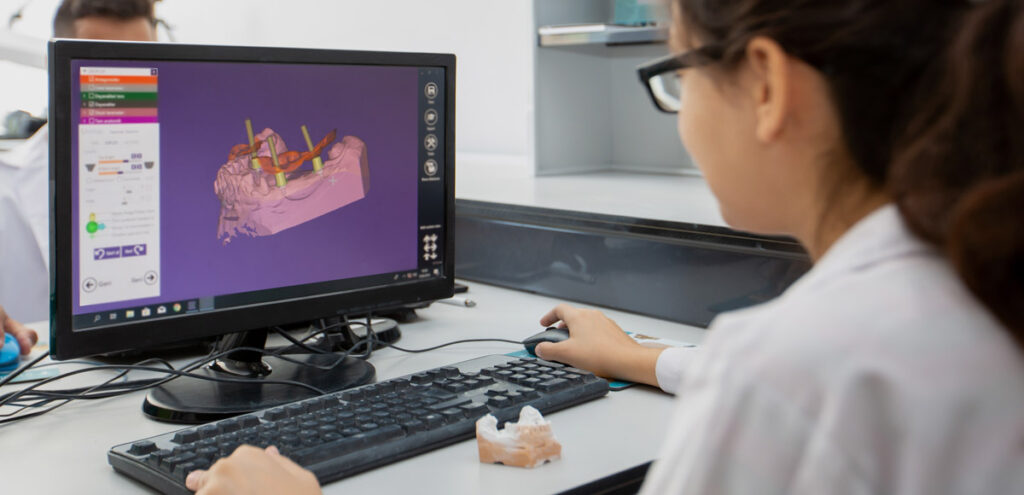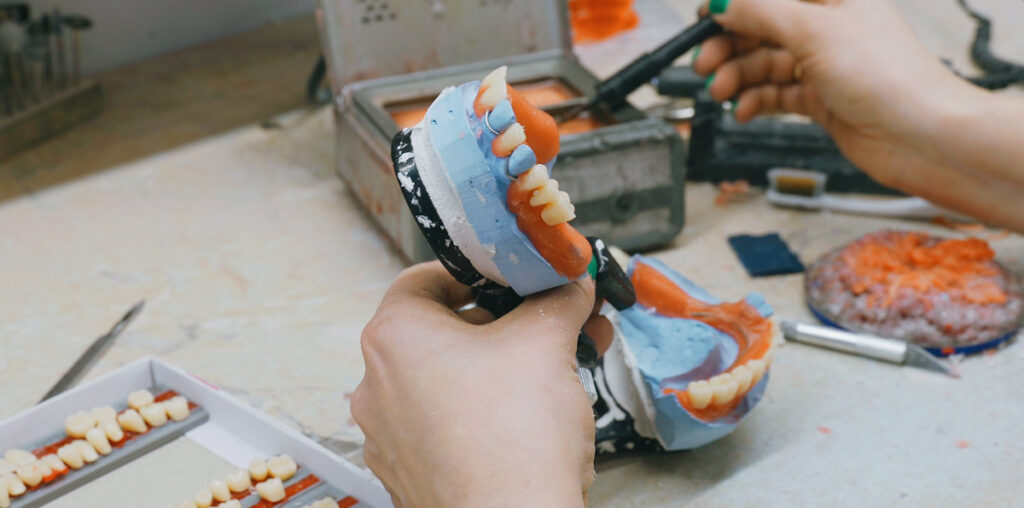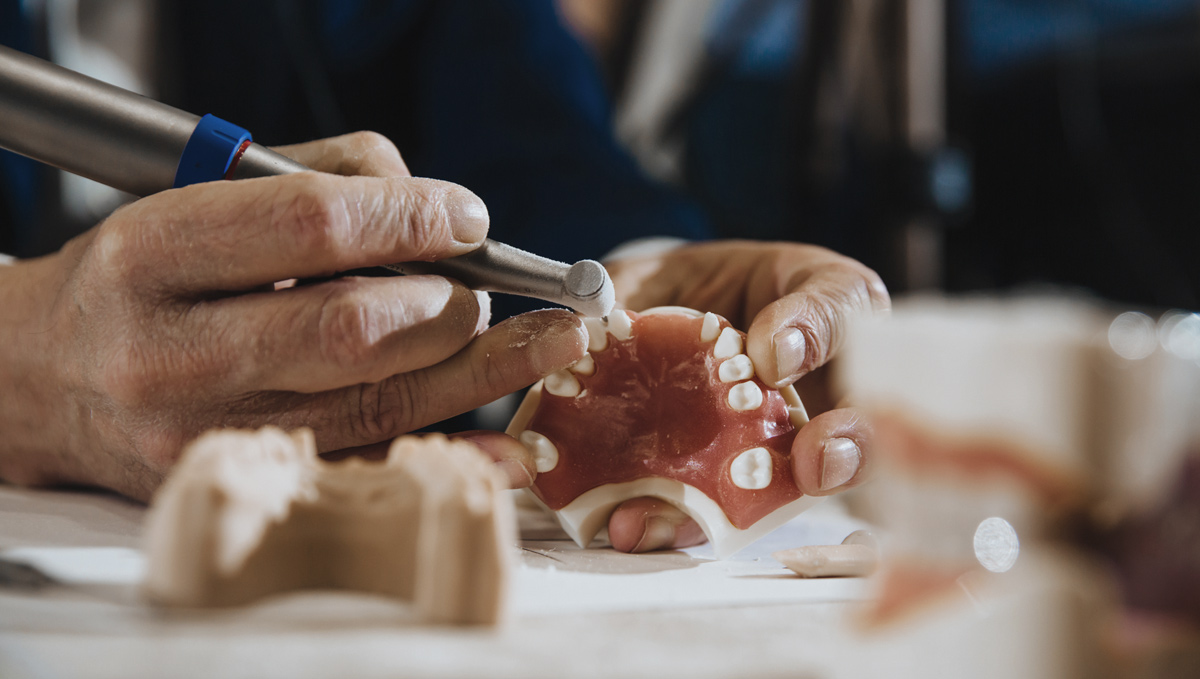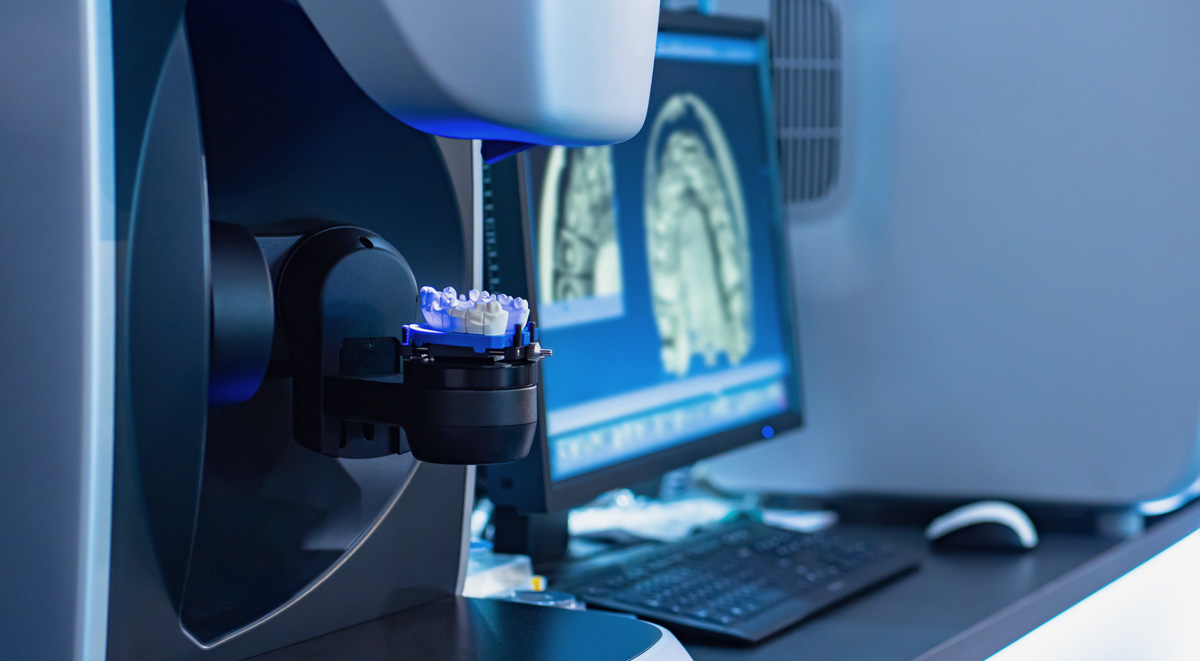A successful dental practice depends on teamwork, accuracy, and trust. One of the most important partnerships in modern dentistry is between dentists and their dental lab.
As digital dentistry continues to grow, this relationship matters more than ever. Whether you’re using digital impressions, high-quality dental restorations, or advanced technology to achieve a seamless fit, working closely with your lab can improve patient outcomes and make your workflow smoother.
This guide looks at how dental professionals across the UK can make the most of their dental lab partnerships by improving efficiency, consistency, and quality, helping them deliver better care to their patients.
The impact of a strong dental lab partnership on your practice
How a reliable lab improves patient outcomes
A reliable dental lab is more than just a supplier. Skilled technicians help ensure every crown, bridge, or denture meets the highest standard, both functionally and aesthetically.
A precise fit, superior aesthetics, and minimal adjustments during fitting appointments all contribute to better patient outcomes and reduced chair time.
Enhancing your practice’s reputation through quality lab work
High-quality restorations that are consistent help build your practice’s reputation. Patients can tell when restorations look and feel natural, and many dentists see that happy patients often return and recommend their services to others. Choosing a reliable dental lab partnership is a smart step toward long-term success for your practice.
Understanding the role of your dental lab
What dental labs do for dentists
Dental labs play a vital role in delivering dental appliances that both work well and look good. From crowns and bridges to vacuum-formed appliances and denture repairs, a good lab can handle many different clinical needs.
With access to modern techniques and materials, labs help dentists give patients custom treatment options for missing teeth, dental implants, and other complex dental cases.
Key services offered by dental labs in the UK
In the UK, most dental labs are staffed by GDC-registered dental technicians. This ensures that all dental products and services meet strict professional standards.
Many laboratories also offer digital services, such as working with intraoral scans, planning digital cases, and collaborating on computer-aided design, giving practices access to the latest digital solutions.
Choosing the right dental lab
Factors to consider when selecting a lab
Choosing a dental laboratory that aligns with your clinical needs and values is crucial. Consider whether the lab is familiar with your preferred implant systems, digital scanner brand, and the type of restorations you commonly request. Labs should also demonstrate a commitment to delivering consistent results and an efficient service.
Checking certifications and quality standards
It’s important to check that the lab and its technicians are GDC-registered. This ensures they adhere to ongoing professional development and quality standards.
Many dentists benefit from building long-term relationships with labs that prioritise clear communication, digital workflow compatibility, and a unique personalised service.
Building effective communication
Establishing clear lines of communication
Clear and steady communication is key to a strong lab partnership. Talking about clinical needs and patient details before sending cases helps avoid expensive mistakes.
This is even more important for complex restorations or when working with existing teeth that need to match new dental appliances.

Using digital tools to improve collaboration
Digital tools make collaboration easier and faster. Sharing digital files, digital scans, and case notes using platforms that support digital dentistry reduces delays and ensures accurate results.
With intraoral scanning and cloud-based platforms, dental professionals and technicians can collaborate more closely than ever before.
Setting expectations and agreements
Defining turnaround times and delivery schedules
Making expectations clear from the start helps stop problems before they happen. Agreeing on turnaround times, how deliveries will be made, and how long things should take makes sure patients get their restorations on time. This kind of planning also helps the lab stay organised and work more smoothly.
Clarifying pricing and billing procedures
Being clear about costs is just as important. Dentists should make sure they know the lab’s prices, including any extra charges for digital cases, shade taking, or urgent work. When costs are clear, it helps keep the working relationship smooth, professional, and based on trust.
Customisation and case planning
How to provide precise prescriptions and specifications
Every patient is different, so giving clear prescriptions and instructions is very important. With digital impressions and computer-aided design, it is now easier to share exact details for restorations, such as the shape, shade, and fit, with your dental lab.
Collaborating on treatment planning
Collaborating with your lab during the planning phase of more advanced cases, such as those involving dental implants or full-arch bridge restorations, can significantly improve outcomes.
Input from skilled technicians ensures that restorations are specifically designed to suit the patient’s mouth, existing teeth, and overall aesthetic goals.
Quality control and feedback
Monitoring lab work quality consistently
Keeping a high standard of clinical results means regularly checking the quality of the lab’s work. Looking at how well restorations fit, how they look, and how long they last can help spot patterns over time. Paying attention to these details gives a better idea of what is going well and what might need to be improved.

Providing constructive feedback for improvements
Offering constructive feedback strengthens the lab-dentist relationship. Most dental laboratories welcome honest communication and use it as an opportunity to enhance their products and services.
In the long term, this kind of collaboration ensures your lab consistently delivers work that supports excellent patient care.
Leveraging Technology in Your Partnership
Digital impressions and CAD/CAM integration
Digital impressions today are revolutionising dental workflows. Intraoral scanning eliminates the need for physical impressions and enables highly accurate data collection. This digital data feeds directly into computer-aided manufacturing systems, allowing for restorations that are accurate, aesthetic, and delivered with minimal delay.
Benefits of virtual consultations and design approvals
Using digital tools also allows for virtual consultations and design approvals. Dentists can view proposed restorations, make suggestions, and sign off on cases without the need for physical models or long turnaround times. These digital solutions reduce errors, save time, and support a more modern approach to dentistry.
Troubleshooting common challenges
Handling delays and remakes professionally
Even with careful planning, delays and remakes can still happen, but a proactive approach to solving problems builds confidence and trust. Choosing a lab that responds quickly and handles problems well helps protect your practice’s reputation and keeps patients happy.
Resolving misunderstandings effectively
Misunderstandings between labs and dental practices can usually be traced back to unclear instructions or communication gaps.
By revisiting procedures and keeping an open dialogue, these problems can be resolved efficiently and used as learning experiences to strengthen the partnership.
Maximising the partnership for practice growth
Using lab expertise to enhance patient satisfaction
A dental lab can be an active partner in your practice’s growth. Their expertise with new materials, techniques, and workflows can help you offer patients the most advanced dental care available. Discussing new product lines or emerging trends with your lab gives you a competitive edge.
Exploring new materials and innovative solutions
Exploring modern materials, digital appliances, and technologies representing advanced technology not only improves patient outcomes but also helps you attract new clients.
The right lab will support your goals with a shared commitment to quality, innovation, and the future of digital dentistry.
GoDigital Dental laboratory: expert dental technicians dedicated to going the extra mile for clients
At GoDigital Dental, we understand the value of precision, consistency, and communication in every successful dental lab partnership. Our team of GDC-registered dental technicians combines decades of hands-on expertise with the latest in digital dentistry to provide high-quality restorations with a seamless fit.
From digital impressions to advanced computer-aided manufacturing, we support dental professionals across the UK with a complete digital workflow designed to enhance patient outcomes and reduce chairside adjustments.
Our lab is equipped to work with major intraoral scanners, and we are committed to delivering digital cases with speed, precision, and care. At GoDigital, we go the extra mile to provide a unique personalised service, giving our clients full confidence in every restoration we produce.
Partner with us and experience the benefits of a modern dental laboratory that puts quality, technology, and client satisfaction first.
FAQs
How can I improve communication with my dental lab to ensure better results?
Improving communication with your dental lab starts with giving clear and detailed instructions for every case. Always include accurate prescriptions, shade details, and any special requests, as this reduces mistakes and saves time. Using digital impressions and digital files can also help, as they give dental technicians precise information about the patient’s mouth and existing teeth.
It is also important to agree on preferred communication methods so queries are answered quickly. Discussing complex cases in advance ensures both the dentist and the lab understand the goals and requirements, which makes it easier to achieve high-quality restorations and consistent results.
What feedback process should I establish with my lab for quality improvement?
A good feedback process with your dental lab should be clear, regular, and easy to follow. After receiving restorations, take time to check the fit, function, and appearance, then share your findings with the lab. Point out what worked well as well as areas that need improvement. Simple, direct communication helps skilled technicians understand exactly how to make adjustments for future cases.
It can also help to set up a routine for feedback, such as reviewing complex or digital cases together at agreed intervals. This keeps both dentist and lab on the same page, supports continuous improvement, and ensures patients receive high-quality restorations every time.
Are there ways to build a stronger, long-term partnership with my lab?
Building a strong, long-term partnership with your dental lab begins with trust and reliability. Choosing a registered dental laboratory with skilled technicians gives confidence in the quality of restorations, and being clear about expectations helps both the dentist and the lab work smoothly. Sharing full case details, including digital impressions and shade instructions, ensures restorations are correct and meet patient needs.
A lasting partnership also develops through consistency and respect. Using the same lab allows technicians to understand your style and preferences, giving consistent results. Treating the relationship as a teamwork effort rather than a transaction makes it easier to succeed together.
What strategies help encourage more efficient times for lab work?
Encouraging efficient times for lab work starts with sending your dental lab complete and accurate case details. Clear prescriptions, shade information, and digital impressions reduce errors and save time. Digital files are faster to share than traditional impressions and give technicians precise information, helping them deliver high-quality restorations more quickly. Setting agreed timelines for different types of work also helps both parties stay organised.
Good communication is just as important. Replying quickly to questions and confirming details prevents delays. Working with a dental laboratory that uses digital workflow and advanced technology can further improve speed and consistency.
What digital tools or platforms can we use to collaborate more effectively?
Using digital tools and platforms can make collaboration with your dental lab much easier and more accurate. Digital impressions from an intraoral scanner give technicians precise details of the patient’s mouth, reducing the need for adjustments. Sharing digital files securely allows cases to be reviewed quickly and helps streamline the digital workflow. Many labs also use computer-aided design and computer-aided manufacturing systems, which ensure restorations have a precise fit.
Platforms that support image sharing, case tracking, and real-time communication are also useful. These digital solutions help everyone work more efficiently, improving consistency and patient outcomes.
Should we schedule regular meetings with our dental lab to align on goals and feedback?
Yes, scheduling regular meetings with your dental lab is very helpful. These meetings allow for discussions about upcoming cases, treatment goals, and patient-specific requirements. By aligning on expectations, you can ensure that restorations meet the desired quality, fit, and aesthetics, reducing delays or mistakes.
Regular discussions also help plan for complex cases, such as dental implants and bridge restorations. Even short meetings can clarify timelines and priorities, keeping workflow efficient. Meeting consistently strengthens the partnership, ensures everyone understands the practice’s standards, and supports better results for patients with high-quality dental restorations.
Can dental labs develop custom workflows for specific procedures?
Good dental labs can create custom workflows designed for specific procedures. By knowing the dentist’s preferences, the lab can set up processes for crowns, bridges, dentures, or dental implants that are reliable and efficient. Custom workflows help make sure restorations fit well, have the correct shade, and provide high-quality results for every patient.
Labs can also use digital solutions, such as digital impressions, computer-aided design, and computer-aided manufacturing, to make these workflows faster. This lets dental technicians work more efficiently while keeping the highest standards. Custom workflows increase consistency, save time, and support better patient outcomes.
How can we work together to manage patient expectations?
Managing patient expectations starts with clear communication between the dental practice and the lab. Dentists should explain treatment options, timelines, and what the restorations will look and feel like. Sharing detailed prescriptions, digital impressions, and case notes with the lab helps ensure the final restorations match what has been discussed with the patient.
Working closely with the lab allows both parties to anticipate challenges, such as complex dental implants, bridge restorations, or dentures. By planning together and providing realistic timeframes, dentists can set accurate expectations. This teamwork helps patients understand the process, reduces surprises, and improves satisfaction with high-quality dental restorations.
Do labs stay up-to-date with the latest advances in dentistry?
Yes, many dental labs stay up-to-date with the latest advances in dentistry. GDC-registered dental technicians often take part in continuing professional development to learn about new materials, techniques, and technologies. Labs also invest in advanced technology, such as digital scanners, computer-aided design, and computer-aided manufacturing, to provide accurate and high-quality dental restorations.
Keeping up with developments allows labs to offer new digital solutions, improve workflow efficiency, and maintain consistent results. By staying current, labs can support dentists with innovative options for crowns, bridges, dentures, dental implants, and other dental appliances, enhancing patient outcomes and satisfaction.
How do dental labs handle confidential patient data?
Dental labs handle confidential patient data very carefully to comply with privacy regulations. They ensure that all patient information, including digital files, case notes, and images, is stored securely and only shared with authorised personnel. Dental technicians follow strict guidelines to maintain confidentiality at every stage of the process.
Many labs use secure digital platforms for sharing and storing data, such as encrypted emails or cloud systems, to prevent unauthorised access. By keeping patient records safe and following professional standards, dental labs protect both the practice and patients, while ensuring that high-quality restorations can be delivered efficiently and accurately.



